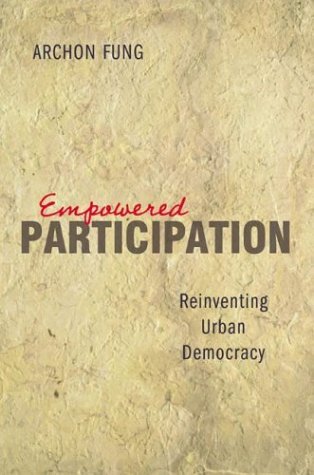Connect with me on Twitter or Facebook here:
Books
Empowering Affected interests: democratic inclusion in a globalized world
edited, Archon Fung and Sean W.D. Gray
Many demands for democratic inclusion rest on a simple yet powerful idea. It's the principle of affected interests. The principle states that all those affected by a collective decision should have a say in making that decision. Yet, in today's highly globalized world, the implications of this “All-Affected Principle” are potentially radical and far-reaching. Empowering Affected Interests brings together a distinguished group of leading democratic theorists and philosophers to debate whether and how to rewrite the rules of democracy to account for the increasing interdependence of states, markets, and peoples. This title is also available as Open Access on Cambridge Core (you can download any or all of it here free of charge).
(Cambridge University Press, 2024)
When democracy breaks: studies in democratic erosion and collapse, from ancient athens to the present day
edited, Archon Fung, David Moss and Odd Arne Westad
Democracy is often described in two opposite ways, as either wonderfully resilient or dangerously fragile. Curiously, both characterizations can be correct, depending on the context. When Democracy Breaks aims to deepen our understanding of what separates democratic resilience from democratic fragility by focusing on the latter. The volume’s collaborators—experts in the history and politics of the societies covered in their chapters—explore eleven episodes of democratic breakdown, ranging from ancient Athens to Weimar Germany to present-day Turkey, Russia, and Venezuela. Strikingly, in every case, various forms of democratic erosion long preceded the final democratic breakdown. Although no single causal factor emerges as decisive, linking together all of the episodes, some important commonalities (including extreme political polarization, explicitly anti-democratic political actors, and significant political violence) stand out across the cases. Moreover, the notion of democratic culture, while admittedly difficult to define and even more difficult to measure, may play a role in all of them.
(Oxford University Press, 2024)
Open Budgets: The Political Economy of Transparency, Participation, and Accountability
Rigorous analysis of the causes and consequences of fiscal transparency is thin at best. Open Budgets seeks to fill this gap in existing knowledge by answering a few broad questions: How and why do improvements in fiscal transparency and participation come about? How are they sustained over time? When and how do increased fiscal transparency and participation lead to improved government responsiveness and accountability?
(Brookings, 2013)
Full Disclosure: The Perils and Promise of Transparency
"Packed with ideas and information, Full Disclosure is, by far, the best book to date on the problem of public transparency. The authors offer a host of indispensable lessons for citizens and policymakers in diverse domains, including education, pollution, nationalsecurity, and health care. At the same time, Full Disclosure is animportant contribution to democratic theory —and a great read to boot." Cass Sunstein, University of Chicago
You can download and read the book free of charge here on Cambridge Core Open Access.
(Cambridge University Press, 2007)
Democracy at Risk: How Political Choices Undermine Citizen Participation and What We Can Do About It
“Democracy at Risk is an... impressive collaboration of which political scientists can be proud, this book should be of interest to all who care about the state of citizenship, and what may be done to improve it.” Theda Skocpol, Harvard University
(Brookings Institution Press, 2005).
Empowered Participation: Reinventing Urban Democracy
"Fung rediscovers the best traditions of American self-government... in a book bristling with insight... that should be required reading for every student, scholar, and citizen of Democracy." Lani Guinier, Harvard University.
(Princeton University Press, 2004). Check out the book on Amazon.Com.
Deepening Democracy: Institutional Innovations in Empowered Participatory Governance
“This is an inspirational political critique but at the same time a program for critical politics.” Michael Burawoy, University of California, Berkeley
(With Erik Olin Wright) (Verso Press, 2003). Check out the book on Amazon.Com.
Can We Put An End To Sweatshops?
“If Kathy Lee Gifford had read this brief but potent and provocative book, not only might she have avoided her public humiliation as a sweatshop profiteer off the labor of underpaid women in Honduras, but she might even have had a few intelligent solutions to the problem.” Publishers Weekly
(With Dara O'Rourke and Charles Sabel) (Beacon Press 2001). Check out the book on Amazon.Com.
Working Capital: The Power of Labor's Pensions
"Working Capital... shows that great wealth can be invested in line with the values of workers as well as their economic self-interest.... The implications for American society are awesome." William Greider
(Edited, with Tessa Hebb and Joel Rogers), Forward by Leo Gerard (Ithaca: Cornell University Press, 2001). Check out the book on Amazon.Com.
Beyond Backyard Environmentalism
(With Charles Sabel and Bradley Karrkainen), Forward by Hunter Lovins and Amory Lovins (Boston: Beacon Press, 2000). Check out the book on Amazon.Com.
Constitution, Democracy, and State Power: The Institutions of Justice
A four volume reference collection, edited by Joshua Cohen and Archon Fung (Cheltenham: Edward Elgar Publishing, May 1996). Check out the book on amazon.com.
Introduction: Just Institutions (download the introduction)










